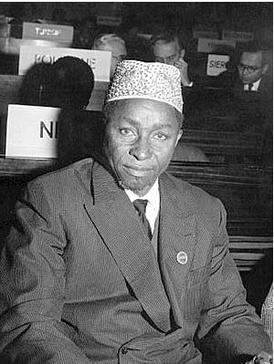Amadou Hampâté Bâ facts for kids
Quick facts for kids
Amadou Hampâté Bâ
|
|
|---|---|
 |
|
| Born | 1900/1901 Bandiagara, Mali
|
| Died | 13 May 1991 (aged 90–91) |
| Occupation | Writer and ethnologist |
Amadou Hampâté Bâ (born around 1900/1901 – died 1991) was a famous writer, historian, and expert on cultures (an ethnologist) from Mali. He was very important in African writing and culture during the 1900s. He strongly believed in protecting Africa's oral tradition (stories and knowledge passed down by talking) and old ways of knowing things. He is famous for saying: "Whenever an old man dies, it is as though a library were burning down." This means that when an elder passes away, a lot of valuable knowledge is lost.
About Amadou Hampâté Bâ
Amadou Hampâté Bâ was born into a noble Fula family. His birthplace was Bandiagara, a large city in what was then called French Sudan. This area was part of the French colony of French West Africa.
When his father passed away, his mother's second husband, Tidjani Amadou Ali Thiam, adopted him. Amadou first went to a Qur'anic school. This school was led by Tierno Bokar, a respected spiritual leader. Later, he attended French schools in Bandiagara and Djenné. In 1915, he left school and went to live with his mother in Kati, where he continued his studies.
In 1921, he decided not to join a special school in Gorée. As a result, the governor sent him to Ouagadougou to work for the colonial government. From 1922 to 1932, he worked in different government jobs in French Upper Volta (now Burkina Faso). From 1932 to 1942, he worked in Bamako. In 1933, he took time off to visit his spiritual teacher, Tierno Bokar.
In 1942, he got a job at the French Institute of Black Africa (IFAN) in Dakar. The director, Théodore Monod, helped him get this position. At IFAN, Amadou studied different cultures and collected traditional stories. For 15 years, he focused on this research. This work later helped him write his book L'Empire peul de Macina (The Fula Empire of Macina). In 1951, he received a grant from UNESCO. This allowed him to travel to Paris and meet other experts who studied Africa.
When Mali became independent in 1960, Bâ started the Institute of Human Sciences in Bamako. He also represented his country at UNESCO meetings. In 1962, he was chosen to be on UNESCO's executive council. In 1966, he helped create a standard way to write down African languages.
His time on the executive council ended in 1970. After that, he spent the rest of his life researching and writing. In 1971, he moved to Abidjan, Côte d'Ivoire. There, he organized all the West African oral traditions he had collected. He also wrote his life story, which was published after he passed away. Amadou Hampâté Bâ died in Abidjan in 1991.
Important Books
Here are some of Amadou Hampâté Bâ's well-known books:
- L'Empire peul du Macina (1955)—The Fula Empire of Macina
- Vie en enseignement de Tierno Bokar, le sage de Bandiagara (1957, rewritten in 1980)—The Life and Education of Tierno Bokar, the Wise Man of Bandiagara
- translated into English and published as A Spirit of Tolerance: The Inspiring Life of Tierno Bokar (2008)
- Kaïdara, récit initiatique peul (1969)
- L'étrange destin du Wangrin (1973)
- translated into English and published as The Fortunes of Wangrin (1987)
- won the Grand prix littéraire d'Afrique noire (1974)
- L'Éclat de la grande étoile (1974)—The Brightness of the Great Star
- Jésus vu par un musulman (1976)—Jesus, as Viewed by a Muslim
- Petit Bodiel (conte peul) et version en prose de Kaïdara (1977)—Little Bodiel (a Fula tale) and a prose version of Kaïdara
- Njeddo Dewal, mère de la calamité (1985)—Njeddo Dewal, Mother of Calamity
- La poignée de poussière, contes et récits du Mali (1987)—A Handful of Dust, Malian Stories
- Kaïdara (1988)—Kaydara: The Mysterious Journey [1]
Memoirs
These books tell his life story:
- Amkoullel, l'enfant peul (1991)—Amkoullel, the Fula Child
- Oui mon commandant! (1994)—Yes, My Commander (published after he died)
See Also
- Sufi studies
 | Anna J. Cooper |
 | Mary McLeod Bethune |
 | Lillie Mae Bradford |

